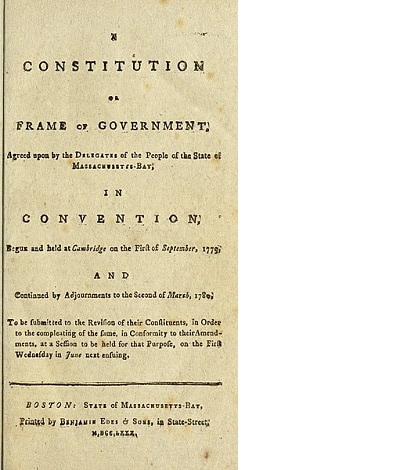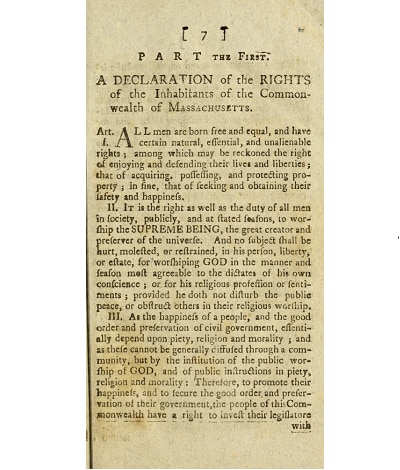Introduction
“Written primarily by John Adams, the Massachusetts Constitution served as the model for the United States Constitution”
The Massachusetts Constitution, ratified by the legal voters of the Commonwealth in 1780, remains the oldest constitution currently in effect in the world. Written primarily by John Adams, it served as the model for the United States Constitution.
Naturally, many amendments have been made to the Massachusetts Constitution in order to meet the needs of an ever-changing and advancing society: these changes are referred to as the Articles of Amendment. In fact, Article XLVIII, which was adopted in 1918, now governs the amending process.
Between 1779 and 1919 Massachusetts held four large-scale and heavily documented constitutional conventions [1779-1780, 1820-1821, 1853, 1917-1919] and they were used as the main mechanism through which changes could be made to the constitution.
The Massachusetts General Court continues to hold constitutional conventions, and today they are synonymous with “joint sessions.” (See also Rule 23 of the Joint Rules of the Senate and House of Representatives)
Additional Resources
When, why, and how is an Article of Amendment passed?
“Constitutional amendments must go through two sessions of the Massachusetts General Court and must also be supported by 25% of the legislature during each of these sessions”
The State Library often receives questions from researchers interested in understanding when, why, and how an Article of Amendment was passed. These types of amendments go through a different process than amendments to the General Laws of Massachusetts, for example.
In brief, initiative petitions and legislative referrals for constitutional amendments must go through two sessions of the Massachusetts General Court and must also be supported by 25% of the legislature during each of these sessions. If the proposed amendment receives enough legislative support, it then gets put on the next ballot for Massachusetts citizens to vote on.
Below are some common questions about Articles of Amendment and helpful suggestions on where researchers can find information.
How do I find out when an Article of Amendment passed?
- Annotated versions of the Massachusetts Constitution, which are included in the bound volumes of the annotated General Laws of Massachusetts. The State Library has both Massachusetts General Laws Annotated [published by Thomson Reuters] and Annotated Laws of Massachusetts [published by LexisNexis] editions in paper. (Available on-site in the State Library)
- Westlaw online database. (Available on-site in the State Library or remotely for state employees)
I’m researching an amendment that was proposed/passed prior to 1920. Where should I look?
- Constitutional Convention documents: If the amendment was proposed/passed prior to 1920, it was probably done so during a constitutional convention, for which there is a lot of documentation. These documents are available in the State Library’s digital repository.
- If the official convention documents do not contain any information, try using the resources suggested in the next section.
I’m researching an amendment that was proposed/passed after 1919. Where should I look?
- House and Senate Journal indexes and bill histories: Check the subject indexes under “Constitution of the Commonwealth” in the journals for the year the amendment was adopted, as well as in the previous session’s journal indexes. This will help you determine the bill number(s) assigned to the proposed amendment. Then look at the bill history for the bill, which is also provided in the journals starting in the 1970s.
- Bill histories include names, dates, actions, bill numbers to previous drafts, and page numbers to entries in the journals where you may find some discussion.
- Legislative Documents: You can also keyword search the “Legislative Documents” collection in the State Library’s digital repository for the text of proposed amendments, whether or not they ultimately passed. If you have trouble finding the document you’re seeking, try looking in the House and Senate Journal indexes.
- House and Senate Journals and Massachusetts Legislative Documents published after 2010 can be found on the General Court's website.
I want to see how the public voted on the proposed amendment. How do I do that?
A constitutional amendment must always be adopted by the people of Massachusetts, and this is done through a ballot question. The Secretary of the Commonwealth’s Elections Division compiles election statistics and voter data in a publication popularly referred to as “PD43” (short for “Public Document 43”).
There are two ways this data can be accessed:
- Massachusetts Election Statistics (1890-current)
- PD43+ database (1970-current)
Where else can I find information?
- Westlaw online database: Includes historical and editorial notes about the Massachusetts Constitution, as well as judicial opinions and related case law citations. (Available on-site in the State Library or remotely for state employees)
- State House News Service (1972-current): Located in the State House, SHNS is an unofficial news outlet that covers state government. Pre-1986 issues can be found on microfilm; issues from 1986-current can be found on the SHNS subscription website. (Available on-site in the Library)
- Historical Boston Globe (1872-1994): Search the historical Boston Globe in databases offered through the State Library for articles relating to state government. (Available on-site in the Library and remotely with a State Library card)
- HeinOnline: This database of primary and secondary legal materials includes articles and law reviews from prominent journals. (Available on-site in the Library and remotely with a State Library card)
Additional Resources
Contact
Online
Phone
Open M-F 9 a.m.–5 p.m.
Open M-W 9 a.m.–5 p.m. Closed Th-F *Advance appointments highly recommended

